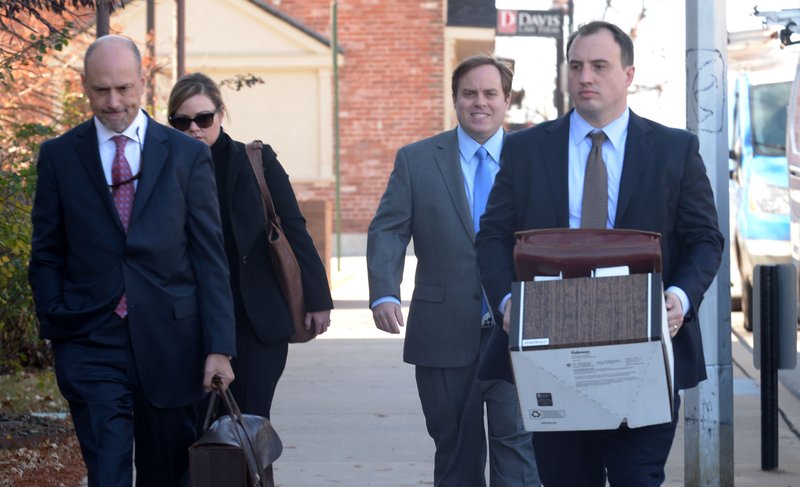FAYETTEVILLE -- Discovery of a cache of 79 more secret audio recordings made by former state Rep. Micah Neal has caused a delay in the corruption case involving former state Sen. Jon Woods.
U.S. District Judge Timothy Brooks will set a new trial date after a hearing to consider the impact of the new evidence, he said in a court order Friday. Neither the hearing nor the new trial date was set by the end of the day Friday, court records show.
Also indicted in the Woods case are Oren Paris III, president of Ecclesia College in Springdale; and consultant Randell Shelton Jr. The three are accused of arranging kickbacks to Woods and Neal, both Republicans from Springdale, in return for state grants to the college. Neal pleaded guilty Jan. 4 to one count of conspiracy to commit fraud.
The government and defense counsel sparred in September over whether some recordings made in secret by Neal could be used as evidence. The government prevailed, with Brooks ruling that those recordings were admissible in court. However, the existence of more recordings became known to attorneys in the Woods' case on Nov. 15, according to court documents.
"All parties generally agreed that an evidentiary hearing would be proper, but only after the parties have an opportunity to finish reviewing the newly discovered evidence that would be subject of that hearing," Brooks' order reads.
"However, the parties also all recognized that it would be impossible for this to be accomplished before Dec. 4, which is when the trial of this matter is currently set to begin."
In a pretrial hearing Thursday, Brooks steadfastly denied a request to delay the trial on other grounds. He changed his mind in light of the new evidence after a conference in his chambers at the end of Thursday's hearing, according to Friday's court order.
Woods' attorney, Patrick Benca of Little Rock, had urged earlier Thursday that the trial be delayed because of the volume of documents in the case. Brooks rejected that argument. The request for delay that was granted Friday over the new recordings was from all parties, including the U.S. Justice Department, according to the order.
Neal's attorney, Shane Wilkinson of Bentonville, also was present at Thursday's closed hearing in the judge's chambers. He said Friday after the order was filed that his client provided federal investigators everything they asked for when he turned over the first set of recordings.
"Somebody somewhere -- I think it was defense counsel -- realized something was missing," Wilkinson said.
Court records specifically credit Shelton's defense counsel for finding gaps. Attorneys Shelly Koehler and Chad Atwell, both of Fayetteville, represented Shelton at the hearing and filed the motion to dismiss that was the subject of Thursday's in-chambers hearing.
"The Department of Justice reached out to us on the same day as that letter," said Wilkinson, referring to a Nov. 15 letter by the Justice Department informing defense attorneys of the existence of more recordings. "They told everyone as soon as they knew, they just didn't know until then."
"In my opinion, I don't think anybody intended to hide anything," Wilkinson said.
The Nov. 15 letter Wilkinson referred to was entered into the court's public record Friday.
"The government does not have these recordings in its possession and does not intend to obtain them unless obtained by defense counsel," according to that letter by Aaron Jennen, assistant U.S. attorney in the case against Woods, Paris and Shelton.
Neal's plea agreement says Woods, Paris, Shelton and lobbyist Milton R. "Rusty" Cranford all participated in kickbacks in return for state grants. Cranford, an executive in the now-defunct nonprofit corporation Alternative Opportunities and its offshoot, AmeriWorks, has not been charged.
The kickbacks were in return for state General Improvement Fund grants to Ecclesia College and AmeriWorks, according to the indictment and plea agreement. Woods, Paris and Shelton have pleaded innocent. Shelton passed the kickbacks for Ecclesia to the lawmakers through consulting fees paid by the college, according to the indictment.
Wilkinson has the additional recordings and is willing to provide copies without a subpoena, the Nov. 15 letter said.
"This evening, the government learned that there are additional covert recordings made by Micah Neal that were never obtained by the government," according to the Nov. 15 letter. "Counsel for defendant Shelton had inquired [segment redacted] whether there were additional recordings. This prompted the government's inquiry, which resulted in the government learning this evening that there are 79 additional recordings made by Neal that were not obtained by the government, and thus were not provided in discovery."
Woods faces 15 counts of fraud, all relating to either wire or mail transfers of money. Paris and Shelton are named in 14 of the fraud charges.
All three are charged with one count of conspiracy to commit fraud. Woods is also charged with one count of money laundering in connection with the purchase of a cashier's check.
Legislators controlled the distribution of General Improvement Fund grants until recently. The fund consists of state tax money left unallocated at the end of each fiscal year and interest earned on state deposits. Each legislator was given a share of the fund to be directed to a nonprofit group or government entity. The state Supreme Court declared this method of distribution unconstitutional in a ruling Oct. 5.
The three defendants face up to 20 years in prison on the fraud and conspiracy charges, if convicted. Woods faces an additional 10 years on the money laundering charge, if convicted. All three may also be ordered to forfeit any money or property obtained through their actions, if found guilty.
A Section on 12/02/2017
